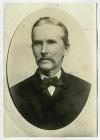WHAT time o'er Persia ruled that upright Khan
Khosru the Good, in Shiraz lived a man,
A beggar-carle, to whose rough hands were given--
I know not how--a mirror clear as heaven
On beauteous, vernal mornings, and more bright
Than streamlets sparkling in midsummer's light;
And, strange to say, who so should look therein,
Though uglier than a nightmare dream of sin,
Grew comely as the loveliest shapes we know;
The while--oh, wonder! a fair form and face
Caught straightway somewhat of celestial grace.
Where'er in twilight dusk, or noontide glow
With swift, firm pace or footstep sad and slow,
Where'er he walked through the broad land of palms,
Or yet his lips unclosed to plead for alms,
The beggar held his mystic treasure high
To glass the forms of those who passed him by;
And all who came within that marvel's range,
Paused spell-bound by the strangely-dazzling change;
Lords, ladies, gazed! the prospect pleased them well;
"Ah, heavens!" they sighed, "how irresistible!"
E'en the coarse hag, foul, wrinkled, and unclean,
Beamed like a blushing virgin of sixteen.
Hearts are transformed with faces; outward beauty
Seems to make quick the inward sense of duty;
For none, of all the charmèd throng that pass
Revivified within the fairy glass,
But pours upon the beggar pence with praise,
Invoking on his head long, golden days,
And every joy that lights our mortal ways.
In vain!--the beggar sickened. While he lay
In death's cold shadow, prostrate and forlorn,
He bade his wife call to him, on a morn,
His only son: "Guard well when I am dead,"
Feebly, with fluttering breath, the old man said;
"This mystic glass, whereby great things are won--
Be shrewd, be watchful; do as I have done,
And thou shalt prosper likewise, O my son!"
He took the precious gift--that brainless wight--
But, scorning to employ its powers aright,
Returned all pale and penniless at night.
"Fool!" cried the angry father, "well I guess
Why thus thou seek'st me, pale and penniless:
O stupid dolt! vain peacock! arrant ass!
Thou hast watched all day thine own face in the glass;
Go to! this foolish fruit of idle pride
No human heart hath ever satisfied,
Far less an empty pocket lined with gold;
Thy coxcomb pate to base self-love is sold!
Yet hearken once again: he's only wise
Who dupes the world through flattery's mirrored lies;
But past all terms of scorn the insensate elf
Who holds its glass therein to view-- himself!"






